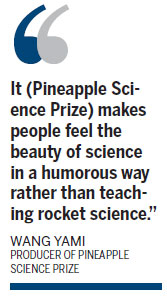Pineapple awards celebrate sciences with touch of humor
(Xinhua) Updated: 2014-04-15 07:17An "invisibility cloak" developed by a team from Zhejiang University can make a goldfish invisible in water and a cat vanish into thin air.
The invention, made with cost-effective glass materials, won the Pineapple Science Prize for physics on Saturday night in Hangzhou, capital of Zhejiang province.
A number of other low cost gadgets and interesting research were on the prize list, including a mechanical donkey and research on the mate preference of fruit flies, at the ceremony co-hosted by Zhejiang Science Museum and Guokr.com, China's popular science website.
"The science prize is unofficial. It makes people feel the beauty of science in a humorous way rather than teaching rocket science," said the producer Wang Yami. Wang sees the main purpose of the prize as linking scientists with ordinary people, making science and scientists more visible to ordinary people.
Besides inventions, research in chemistry, mathematics, psychology and medicine were on the awards list. Some discoveries were that 40 percent of math-phobics are innate, young liars are cleverer and East Asians are more likely to sweat.

Unlike the two previous Pineapple awards, which were for domestic scientists only, this year the prize included Chinese scientists overseas. The prizes in mathematics and psychology were awarded to research teams led by Chinese scientists in the US and Canada.
"Research entered for the prize should be a serious scientific study first, and then should have a unique angle to make them interesting," said Li Miao, a judge and president of the Astronomy and Space Science Research Institute at Sun Yat-sen University.
"In order to find out the truth of love, we worked on fruit flies. In the experiment, we found male fruit flies prefer young females," said Xue Lei, a professor at Tongji University, whose team won the prize in chemistry.
He said that choosing young females as a mate could be the instinct of all animals. A survey of men showed that the dream women for most men are aged around 20.
While the Ig Nobel Prizes honor achievements that "first make people laugh, and then make them think", the Pineapple Science Prize focuses on curiosity and the popularization of science. All the nominees are Chinese.
The prize is named after the fruit because it is difficult to peel, and is also inexpensive and popular among ordinary people.
- More female officials caught in corruption
- Whampoa veterans recorded with glory
- Police bust 9 terrorist groups in Xinjiang
- Knife-wielding attackers seized in Xinjiang
- New regulation leads to drop in petitioned cases
- Hunan plant shut as probe into lead poisoning begins
- Police boost efforts to combat gambling
- Project offers jobs openings to legal experts
- Experts: Dog meat festival 'illegal'
- Nation looks to upgrade
pipeline networks






